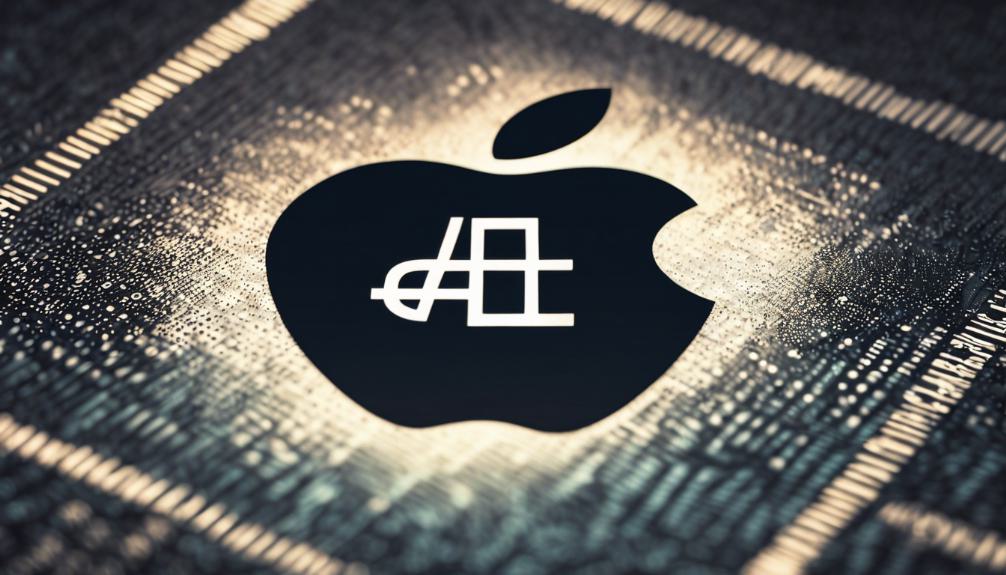Apple's Privacy Promise: A Profit-Driven Illusion
In the digital age, privacy has become a pivotal concern for consumers, leading companies like Apple Inc. to position themselves as bastions of user confidentiality. However, recent allegations suggest a potential dissonance between Apple's privacy promises and its operational practices, specifically its use of a Device Specific Identifier to track user activities. This juxtaposition of public assurances against private actions raises critical questions about the integrity of Apple's privacy stance. As we explore the nuances of these controversies, one must ponder whether Apple's celebrated privacy commitment is genuinely user-centric or a strategic maneuver to cultivate market dominance under the guise of data protection.
Key Takeaways
- Apple faces allegations of misleading users about the extent of its data collection and control.
- The company's strategic use of DSID as a permanent identifier contradicts its privacy protector image.
- Legal challenges highlight a significant gap between Apple's privacy promises and its actual data practices.
- Ethical concerns are raised over Apple's exploitation of detailed user data for competitive and commercial advantages.
Apple's Competitive Edge

Apple has strategically positioned privacy as a key differentiator in the highly competitive tech industry, promising users unparalleled control over their personal data. This approach not only aligns with their commitment to serve their customer base but also sets a standard for ethical conduct in handling user information. By focusing on privacy, Apple aims to foster a trusting relationship with its users, assuring them that their personal details are treated with the utmost respect and care. This strategy is designed to empower individuals, giving them the peace of mind that their private information remains secure. In doing so, Apple endeavors to lead by example, advocating for a future where user privacy is not just a policy, but a fundamental right respected across the tech industry.
Misleading User Control

Despite the tech giant's commitment to user privacy, recent allegations suggest that the control offered to users over their data may not be as thorough as previously promised. This revelation raises significant concerns among individuals dedicated to serving others and upholding ethical standards. The essence of trust and transparency appears compromised, as users are potentially misled about the extent of their control over personal data collection. Such practices not only undermine the fundamental principles of user autonomy but also betray the expectations of those who prioritize privacy in their digital interactions. This situation calls for a reevaluation of the mechanisms through which users can genuinely manage their data, ensuring they are not unwittingly contributing to a system that exploits their information for marketing gains.
Lawsuit Allegations

Recent allegations have surfaced, accusing Apple of engaging in deceptive practices that contradict its well-publicized commitment to user privacy. These claims suggest that Apple, despite its outward stance on protecting user data, has been misleading its customers about the extent to which it controls and collects personal information. The lawsuit further alleges that Apple's promise of privacy is not just exaggerated but fundamentally false, arguing that the company collects detailed analytics and user actions through identifiers linked to personal details. This discrepancy between Apple's privacy narrative and its actual data practices raises serious concerns, suggesting a breach of trust with its user base. The legal challenge seeks to hold Apple accountable for these perceived violations of privacy promises, marking a critical examination of the company's practices against its public assertions.
The Illusion of Privacy

The concept of user privacy, once promised as a cornerstone of Apple's brand, now reveals itself as a potentially deceptive facade. This illusion of privacy has become a critical concern for individuals devoted to serving others and protecting their community's digital rights. Despite Apple's portrayal as a privacy-conscious company, emerging details suggest a more complex reality. By leveraging privacy as a competitive edge, Apple has positioned itself in the market in a way that might mislead users about the extent of their control over personal data collection. For those committed to safeguarding personal information, understanding the nuances of Apple's data practices is essential. It's a reminder that the pursuit of genuine privacy protection requires vigilance and a critical examination of companies' privacy assertions.
Violated Privacy Promises

Apple's commitment to user privacy has come under scrutiny amid allegations that the company has not upheld its promises to protect personal data. These concerns spotlight the tension between Apple's public image as a defender of privacy and the actions that suggest otherwise. Lawsuits and investigations reveal a disconcerting pattern: despite Apple's assurances, user data, including DSIDs and Apple IDs tied to personal information, is being collected in ways that users are not fully informed about. This collection extends to detailed analytics data, capturing real-time activities and actions, ostensibly for marketing purposes. Such practices not only challenge Apple's privacy narrative but also raise questions about the ethical considerations of data usage, potentially breaching constitutional rights and undermining the trust users place in the company to safeguard their personal information.
Privacy Deception Tactics

Amid growing scrutiny, deceptive tactics employed by Apple have cast a shadow over its once-vaunted privacy commitments, revealing a complex strategy designed to obscure the true extent of data collection from its users. By positioning itself as a bastion of privacy, Apple has leveraged this image as a competitive advantage, albeit through misleading narratives that suggest users have more control over their data than they actually do. This illusion of empowerment masks the reality of Apple's practices, where the promise of privacy is compromised by actions that contradict their publicly stated values. Such practices not only undermine consumer trust but also raise significant ethical concerns, challenging the integrity of Apple's commitment to safeguarding user privacy and serving their interests.
DSID and User Tracking

Exploring further into Apple's privacy practices reveals the use of DSID and extensive user tracking mechanisms. The DSID, or Apple Device System ID, serves as a permanent, unchangeable identifier linked directly to an individual's personal information, including their name, phone number, and more. This mechanism, integral to Apple's data collection strategy, is a stark contrast to the company's public image as a protector of user privacy. By gathering DSID along with Apple ID data, Apple not only breaches its privacy promises but also undermines the trust users place in its products. This practice highlights a significant gap between Apple's privacy rhetoric and its actions, raising concerns about the true extent of user privacy under Apple's ecosystem.
Collecting User Analytics

Delving into the world of user analytics, it becomes apparent that Apple collects detailed data on real-time user activities, shedding light on the intricacies of its privacy practices. This collection includes granular details of how individuals interact with their devices, applications, and services. Through the lens of serving others, it is essential to understand that such data aggregation, while enhancing user experience and product development, also raises significant privacy concerns. Apple's approach to collecting this data, despite its privacy assurances, underscores a complex challenge in balancing innovation with the fundamental right to privacy. It is imperative for users to be fully informed and for companies to navigate this dynamic with transparency and integrity, ensuring that technological advancement does not come at the expense of individual privacy rights.
Marketing Data Goals

Apple's strategic ambitions extend into transforming into a dominant force in the domain of marketing data, leveraging extensive user information for commercial advantage. This pursuit is not merely a quest for enhancing product offerings but a calculated move to harness the vast pools of user-generated data for finely tuned marketing strategies. By positioning itself at the nexus of technology and consumer insights, Apple aims to craft a more personalized, engaging user experience. This approach serves a dual purpose: it not only enriches the user's interaction with technology but also strategically positions Apple to meet the evolving needs of its clientele. In doing so, Apple aspires to foster a deeper connection with its users, thereby enhancing loyalty and driving sustainable growth through a nuanced understanding of consumer behavior.
Exploiting User Information

While Apple's ambitions in the marketing data sector reflect a strategic effort to enhance user experience, this endeavor also raises significant concerns regarding the exploitation of user information. The company's pursuit of becoming a marketing data powerhouse, as noble as it may seem in the guise of improving services, inadvertently involves leveraging personal data beyond user expectations. The collection of detailed analytics, including actions and behaviors tied to unalterable identifiers like the DSID, underscores a critical issue. It suggests a model where user consent is overshadowed by corporate interests, veiling the true extent of data utilization under the banner of privacy enhancements. For individuals committed to serving others, this revelation prompts a reassessment of the ethical implications surrounding corporate data practices and the protection of consumer rights in the digital age.
Breaching Privacy Rights

The ongoing lawsuit against Apple casts a spotlight on the company's alleged breach of privacy rights, challenging the integrity of its privacy commitments to users. This legal action brings to the forefront concerns that Apple, under the guise of prioritizing user privacy, actually engages in deceptive practices that compromise the very essence of personal data protection. By misleading users about their control over personal data collection and utilization, Apple not only breaches trust but also potentially violates constitutional rights dedicated to privacy. This situation underscores a critical discourse on the ethical responsibility of tech giants in safeguarding user information. It emphasizes the need for transparency and integrity, serving as a call to action for companies to honor their commitments to user privacy genuinely and respectfully.
Legal Proceedings Overview

Building on the concerns raised about privacy breaches, this section offers a detailed examination of the ongoing legal proceedings against Apple. The lawsuit underscores the deceptive nature of Apple's privacy practices, arguing that the company's assurances of user control over personal data collection are misleading. Central to this legal challenge is the allegation that Apple's privacy promises are fundamentally illusory, betraying users' expectations and violating their rights. This action not only highlights the discrepancy between Apple's public privacy commitments and its actual data handling practices but also seeks to hold the tech giant accountable for exploiting users' information for marketing gains. As these proceedings unfold, they underscore the critical need for transparency and genuine privacy safeguards in the digital age.
Data Privacy in News

Frequently, data privacy issues grab headlines, spotlighting the ongoing concerns and debates surrounding the handling of personal information by major corporations. In the modern era, where digital presence is nearly inescapable, the stewardship of personal data by entities like Apple becomes a paramount concern for society. Allegations against Apple, suggesting the company uses privacy as a mere marketing tool while engaging in deceptive practices, raise critical questions about the sincerity of its privacy commitments. Such discussions are not merely academic; they have real-world implications for consumer trust and the ethical responsibilities of tech giants. The dialogue around these issues serves a pivotal function, prompting both public and regulatory scrutiny that aims to hold corporations accountable for their promises and practices concerning data privacy.
Following the Lawsuit Updates
Keeping abreast of the lawsuit's developments, interested parties anxiously await new information regarding Apple's contested privacy practices. The core of the case hinges on allegations that Apple's privacy assurances are not just overstated but intentionally deceptive, exploiting users for marketing gains under the guise of protecting their data. As the legal proceedings unfold, it becomes essential for advocates, legal professionals, and the concerned public to monitor updates closely. This vigilance serves a dual purpose: ensuring accountability for potential breaches of trust and privacy rights, and guiding individuals on how to safeguard their digital footprint amidst evolving corporate practices. The outcome of this lawsuit could set a precedent, influencing how tech giants handle user data and frame their privacy policies in the future.
Frequently Asked Questions
How Can Consumers Effectively Protect Their Privacy While Using Apple Products Despite the Company's Extensive Data Collection Practices?
To safeguard privacy while utilizing Apple products, consumers should actively manage their device settings, opting for maximum privacy configurations and disabling unnecessary data sharing features. Regularly reviewing app permissions and limiting access to personal information can notably reduce data exposure. Utilizing encryption tools and secure communication apps further enhances privacy. Importantly, staying informed about privacy policies and updates empowers users to make more privacy-conscious decisions in a data-driven world.
Are There Any Technological or Legislative Solutions Being Developed to Counteract the Kind of Deceptive Privacy Practices Apple Is Accused Of?
In response to concerns over deceptive privacy practices, various technological and legislative measures are being developed. These aim to enhance user control over personal data and guarantee transparency in data collection methods. Innovations in privacy-preserving technologies, alongside stricter data protection laws, are part of efforts to safeguard consumer privacy. These initiatives underscore the importance of creating a safer digital environment where users can trust that their personal information is handled responsibly.
How Does Apple's Privacy Policy Compare to Those of Its Major Competitors, and Does It Offer Any Real Advantages or Protections for Users?
Apple's privacy policy is often touted as the gold standard, positioning itself as a fortress in the battleground of digital privacy. Compared to its major competitors, Apple emphasizes user control and minimal data collection. However, criticisms suggest this might be more of a mirage than a reality. While Apple provides extensive privacy settings and promises strong data protection, the effectiveness and genuineness of these protections are subjects of ongoing debate and scrutiny.
What Steps Can Individuals Take if They Believe Their Privacy Rights Have Been Violated by Apple, Outside of Joining a Class-Action Lawsuit?
Individuals suspecting privacy rights violations by Apple have several recourses beyond class-action lawsuits. Initially, contacting Apple directly to report concerns allows the company an opportunity to address the issue. Additionally, filing a complaint with consumer protection agencies or regulatory bodies, such as the Federal Trade Commission (FTC) in the United States, can initiate an investigation into the practices in question. Engaging with online privacy advocacy groups can also provide guidance and support in these matters.
Has Apple Made Any Public Statements or Policy Changes in Response to the Allegations of Deceptive Privacy Practices, and if So, What Are They?
In response to allegations of deceptive privacy practices, Apple has publicly addressed concerns through statements and policy revisions aimed at reinforcing their commitment to user privacy. These adjustments underscore Apple's dedication to data protection and transparency, reflecting efforts to rectify identified issues and fortify trust among users. By enhancing privacy policies and clarifying data usage, Apple endeavors to align its practices with the expectations of its community, aiming to serve and safeguard user interests.
Conclusion
To summarize, Apple Inc.'s journey through the tumultuous waters of data privacy allegations highlights a pivotal moment in the discourse on digital ethics. The company, once a beacon of privacy, now navigates the stormy seas of public scrutiny and legal challenges. This situation underscores the imperative for transparent and ethical data practices, ensuring that the veil of privacy is not merely a mirage in the digital desert, but a steadfast commitment to user trust and integrity.

This post has been generated by AI and was not reviewed by editors. This is Not legal advice. Please consult with an attorney.